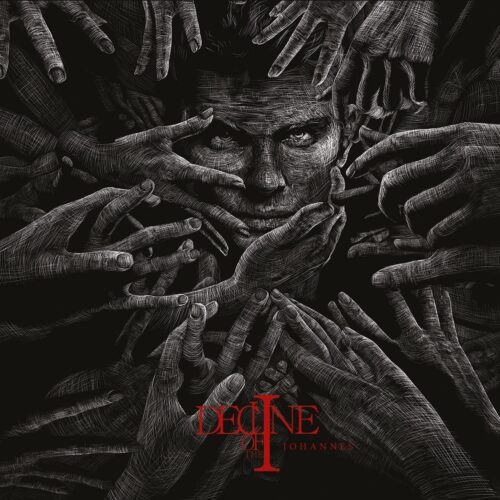 One of the worst things I’ve ever done is miss Mephorash’s 2019 release, Shem Ha Mephorash. I discovered it last year and almost wrote a TYMHM piece on it just outta spite. Thankfully, the wise and mighty Madam X brought this mistake to my attention. After a little research, I discovered just how much depth Mephorash has—slow-moving riffs, glorious heaviness, haunting atmospheres, and… two singers. It’s a unique group and one I’ll keep following in the future. But, why have two singers when you can have three? Though characteristic of goth groups like Tristania, I haven’t thought to search the black metal-verse for such a thing. Enter France’s Decline of the I. Like Mephorash, Decline of the I relies on key atmospheres, orchestration, and beautiful female choirs. The main difference here is that Decline of the I is French. Meaning that you can expect some weird-ass shit on their albums. With a new lineup to support founding member A.K., let’s explore Johannes.
One of the worst things I’ve ever done is miss Mephorash’s 2019 release, Shem Ha Mephorash. I discovered it last year and almost wrote a TYMHM piece on it just outta spite. Thankfully, the wise and mighty Madam X brought this mistake to my attention. After a little research, I discovered just how much depth Mephorash has—slow-moving riffs, glorious heaviness, haunting atmospheres, and… two singers. It’s a unique group and one I’ll keep following in the future. But, why have two singers when you can have three? Though characteristic of goth groups like Tristania, I haven’t thought to search the black metal-verse for such a thing. Enter France’s Decline of the I. Like Mephorash, Decline of the I relies on key atmospheres, orchestration, and beautiful female choirs. The main difference here is that Decline of the I is French. Meaning that you can expect some weird-ass shit on their albums. With a new lineup to support founding member A.K., let’s explore Johannes.
Along with the band’s atmo/melo-black sound, they delve into odd key arrangements, nightmarish sound clips, and a hurricane of vocal layerings. And though I’m not philosphinian like Diabolus or all you idiots that think you know Nietzsche, it’s Decline of the I’s focus. Henri Laborit’s research inspired their first three releases (Inhibition, Rebellion, and Escape). Now the band has shifted focus to Danish philosopher and theologian Søren Kierkegaard.1 With this change, there’s also a greater focus on songwriting. The band still uses unsettling sounds and odd experimentation, but they’ve come a long way from the debut’s untrained Grutle vocals and choppy flow. Johannes has bigger atmospheres, broader structures, and a load of vocal diversity. In reality, Johannes is the cultivation of all the band has been trying to achieve.
Opening with “A Selfish Star,” Johannes begins with a slow burn. Right away, you feel its haunting vibes as the first build ascends. The vocals shriek forth with great strength, and the climbing riffs flow like blood to the heart. But, the blood doesn’t stop there. Now it’s making its way to the brain—hauling layered, cathedral choirs along in its wake. When the song takes a turn, the band’s new female voice rears its ugly, beautiful head. Though the song regains its heaviness, those female cleans only grow stronger. It’s a good opener that doesn’t deviate into the excessively weird so common to the band’s previous releases. In actuality, “Tethering the Transient” is the only song that uses unsettling sound bytes in its structure—working similarly to the depressing sections of Shining’s V – Halmstad. Toss in dueting male vox and terrifying key work, and “Tethering the Transient” is about as powerful and unpleasant as it gets on Johannes.

But the best of the album is “The Veil of Splendid Lies” and closer “Dieu Vide.” The rasps are strongest in the former piece, with shrieks of pain and suffering. Partway through, the song explodes, with all three vocalists lending their weight to the chaos. The sharp rasps charge to the front, the shrieks one step behind, and the haunting female sirens sounding the alarm in the rear. At the end, the keys are the ghost of an abandoned circus in a Thomas Ligotti story. If “The Veil of Splendid Lies” was everything, “Dieu Vide” is everything and more. While the vocal contributions of the first song are fantastic, the closer trumps them. The vocals are a mindfucking vortex—every voice weaving together, yet trying to outdo the other. Then, when you least expect it, the song unloads the heaviest, headbangable riff in the band’s existence.2 So, on we go, powering through the Enslaved-like storm of vocals to the Septicfleshy string atmospheres, around the crushing riffs, and concluding like a flatlining heartbeat.
While I’ve grown fond of the band’s weird approach to songwriting, I’m partial to the flow of Johannes. Escape is a fantastically creepy album, but this new release sees the band put aside effects and spooky interludes for songwriting and strong vocals. Not to mention, the production is superb. No nook or cranny will go unnoticed with its luscious DR10 master. I might still have the biggest boner for Mephorash, but Decline of the I is a pleasant surprise. And its lyrical content and interesting approaches add depth to the style.
Rating: 3.5/5.0
DR: 10 | Format Reviewed: 256 kb/s mp3
Label: Agonia Records
Websites: declineofthei.bandcamp.com | facebook.com/declineofthei
Releases Worldwide: March 26th, 2021

















